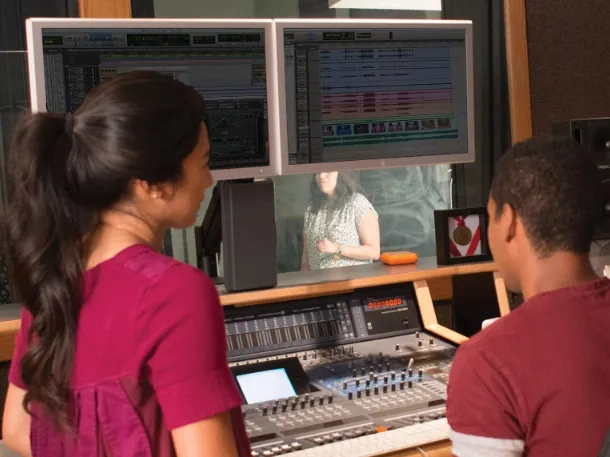- Home
- >
- APU Articles
- >
- News Article
More Than Musicians: 5 Careers in Music to Consider
November 29, 2017 | Category Music | Written By Ana Felce
Read More Articles
Music Entrepreneurship: 5 Careers You Should Consider
Disruptions and advances in technology continue to impact the music industry as musicians strive to connect with audiences, making this an exciting time to be part of the field. Just 20 years ago, musicians focused on finding an agent or getting “discovered.” Now, if you have the talent, you can forge your own path to success in many careers in music. If you have a passion for music and are interested in an exhilarating career, it may be time to consider a degree in commercial music. A commercial music degree will open up your future to a variety of music careers and prepare you with the skills to adapt to a changing industry. Why not be part of the change?
If your sights are set on having a career in music after college, a major in commercial music can provide the education and training for jobs in the field—whether it’s in music business, composition and arranging, performance, or audio recording and production, you can find the track for you.
Here are a few career options you can pursue with a commercial music degree.
1. Music Producer
Music producers need to be able to write, record, and produce songs of high quality that can be distributed. While some people are able to learn the basics of music production by playing with software and exploring on their own, studying music production in college will give you a solid foundation to succeed in the field. A commercial music major provides you with the in-depth knowledge of up-and-coming trends in music that you need to succeed in this career field. You will also learn the tools you need to produce quality music that sells. Building connections through internships and networking with alumni will help you to take the tools and skills you learn in class and master them in the working world.
2. Recording/Live Sound Engineer
Don’t be fooled: the more some things change, the more they stay the same. While the ways in which listeners find a new artist may constantly be emerging, live music will continue to be around, no matter what. And of course, before music goes live it’s engineered in the studio. As Business Insider points out, touring is the most lucrative way that the most popular artists make money. Every music artist needs someone reliable who can ensure that their sound translates well both inside the studio and on the stage as well.
3. Vocalist
Thanks to the internet and television, there are many ways to showcase your talent and get noticed. To get to that level, the commercial music major’s vocal performance track can train you to use proper techniques and styles that will help you develop your abilities. As a student in the vocal performance track, you’ll train more than just your vocal skills. The track’s combination of practical lessons and music theory will make you a stronger, more well-rounded performer and prepare you for a career in singing through lessons in music business, songwriting, and even production.
4. Video Game Composer
You may have considered composing music for movies and television shows as a possible career, but have you ever considered writing music for video games? If you’re someone who enjoys video games, you can imagine all of the music that accompanies the graphics. According to the Bureau of Labor Statistics, the demand for video game designers is expected to grow—and companies need musicians and composers to work with them. After all, music helps to create the immersive world of the most popular video games. Imagine the most popular games like Mario Bros. without its classic tune! It just wouldn’t be the same. If you love music and video games, this might be a job worth considering.
5. Artist Manager
For all the emotions that music makes us feel, it can be easy to forget sometimes that music is a business. And while the world’s best musicians know that, they still need someone on their side to handle issues such as copyright law, royalties, contracts with venues—the list goes on—while they can focus on their art. The skills learned as an artist’s manager not only allow you to work in the field you enjoy so much, but also offer a host of other translatable skills that can be used in other industries as well.